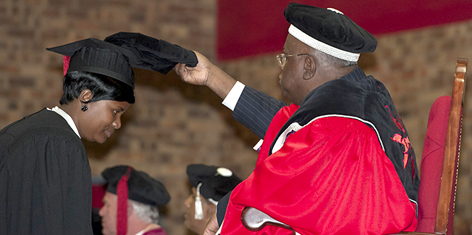Latest News Archive
Please select Category, Year, and then Month to display items
12 January 2024
|
Story Nonsindiswe Qwabe
|
Photo Sonia Small
 Since joining the UFS in 2008, Dr Grey Magaiza has worked extensively on approaches that can foster the socio-economic transformation of societies.
Since joining the UFS in 2008, Dr Grey Magaiza has worked extensively on approaches that can foster the socio-economic transformation of societies.
“The future should be one where communities can decide on their development agenda and futures. That’s the most important for me.” Dr Grey Magaiza, Deputy Director of the Centre for Gender and Africa Studies (CGAS) and Head of the Community Development programme on the Qwaqwa Campus, is passionate about capacitating communities to be agents of change and advancement. His vision for the future emphasises the empowerment of communities to take charge of their development by actively participating in decision making and the implementation of development projects that can improve their lives.
Since joining the UFS in 2008, Dr Magaiza has worked extensively on approaches that can foster the socio-economic transformation of societies. Over the years, he has crafted his research speciality into one that he is most proud of – being an interdisciplinary scientist immersed in the development of communities.
“I’m in a fortunate position of researching what I like. I say ‘fortunate’, because I’ve taken the time to understand what I’m passionate about, which is the overall field of rural livelihoods and livelihood futures – in short, community development. My research starts from an engaged university, understanding the elements that a university must use to enhance transformation and relevance to its immediate community in terms of development.”
One of the ways he has done this is by looking at social entrepreneurship as a development approach for young people in a rural setting. Through workshops with non-profit and civic organisations in Qwaqwa, Dr Magaiza has been helping these organisations to map out their needs and actively meet them through the involvement and support of external role players.
“We understand that communities are part of the national development agenda, but even that national agenda respects community knowledge and intentions and allows communities to shape their identity. A critical enabler of this is community organising. You bring back the capacity in communities to have dialogues on issues affecting them as spaces for engagement, knowledge exchange, and for people to just talk about their way forward.”
By enabling communities to define their development agenda, they can address their specific needs, challenges, and aspirations, he said. “When I look at livelihood futures, it’s quite an exciting aspect of my work – it’s like looking into a fortune tellers’ globe, because you’re not deciding for communities what they should do, but the communities themselves take those decisions.”
Qwaqwa Campus honours academic excellence
2014-05-21
 Photo: Sonia Small (Kaleidoscope Studios)
Photo: Sonia Small (Kaleidoscope Studios)
Photo Gallery
Our Qwaqwa Campus was this past weekend a hive of activity when graduates, their parents and well-wishers descended on the campus to honour outstanding academic excellence during the Winter Graduation ceremonies.
On Friday graduates from the Faculty of Humanities, as well as the Faculty of Economic and Management Sciences, were addressed by Tommy Makhatho, Managing Director of the Qwaqwa-based Bibi Cash and Carry.
Makhatho urged graduates to continue working hard way beyond their graduation day and to dream big.
“Dream big and don’t let your poor background hold you back,” Makhatho said.
“Don’t let people say you can’t or that you will fail. Take up one idea. Make that one idea your life, think of it, dream of it, live on that idea, let your brain, muscle, nerves and every part of your body be full of that idea and leave every other idea alone. This is the way to success. If you don’t build your dream, someone else will hire you to help them build theirs,” said Makhatho, the winner of the 2013 Sanlam/Business Partners Entrepreneur of the Year and Job Creator of the Year awards.
On Saturday, graduates were treated to yet another moving message by eNCA’s news anchor, Mabale Moloi, herself a graduate in Biological sciences.
“If there is one ability that we should all practice on a daily basis, it is work ethics. This is a value based on hard work and diligence,” Moloi said.
Moloi further shared her views on what makes excellent work ethics.
“There are five very important factors of work ethics that we all need to be aware of. One of them is reliability. This means how committed you are to completing a task that is given to you within a particular period of time,” said Moloi.
“The second one is dedication. This means how prepared you are to go the extra mile in completing a job or your studies. Thirdly, one’s level of productivity is very important in having an excellent work ethic. This refers to giving the best of yourself, even to the extent of surpassing what is expected of you.”
“Fourthly, there is co-operation. We all must understand the value of team work and how it leads to success. And this, when paired with character, self-discipline and strong personality, will distinguish you from anyone else,” Moloi added.
Among the more than 800 degrees, diplomas and certificates conferred, were three PhDs in Physics, Polymer Science and Zoology, respectively. Four Masters of Science degrees were conferred cum laude.